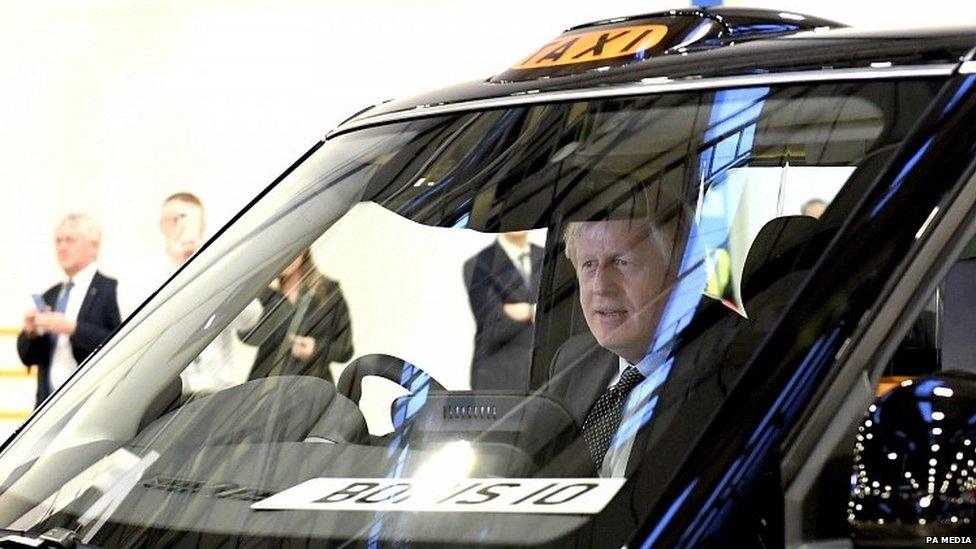General election 2019: PM vows to close 'opportunity gap' after Brexit
- Published
- comments
Boris Johnson: "Our ambition is unlock the whole nation's potential"
Delivering Brexit would help the UK close the "opportunity gap between rich and poor", Boris Johnson has said.
In his first big speech of the election campaign, he promised to boost regional industry and drive a "clean energy revolution" after the UK leaves the EU.
He said a future Tory government would double investment in high-tech research and development to £18bn.
But earlier former Tory David Gauke said Mr Johnson's plan will lead to a "bad outcome for the country".
And Labour said Mr Johnson's Brexit deal was flawed and another referendum was needed.
In other election developments:
Boris Johnson is heckled on a visit to flood-hit Stainforth to see the emergency response
Jeremy Corbyn rows back on comments that he would not back a Scottish independence referendum in the "first term" of a new government
Labour is promising to outspend the Conservatives on the NHS in England
The Lib Dems rule out any electoral pacts with Labour after two of its candidates stand down
Former Tory rebel David Gauke, who is standing as an independent candidate, says an outright Tory would be a "bad outcome" for the UK
The SNP is to take legal action over its exclusion from the ITV head-to-head debate between Boris Johnson and Jeremy Corbyn
The Green Party says it would appoint a Carbon Chancellor to oversee its Green New Deal and policy
Speaking during a visit to an electric taxi manufacturer near Coventry, the PM set out his vision for post-Brexit Britain, saying his goal was to unite the country and "level up" economic performance by boosting the regions.
He said the UK must be at the heart of the world's "green revolution", harnessing the power of science, innovation and technology to tackle climate change and create high-skilled, high wage jobs.
A Tory victory on 12 December would see the UK leave the EU in January, he said, and that would be good for the country's "politics, economy and psychological health" after months of paralysis.
"We must get Brexit done because we are democrats," he said, saying while Leave voters wanted the result of the 2016 referendum result to be respected, Remain voters also accepted the "wrangling had to end".
But he departed from excerpts of the speech briefed to the media on Tuesday, leaving out references to Brexit "groundhoggery" and claims that calls for another Brexit referendum and a further vote on Scottish independence were a form of "onanism", or masturbation.
Asked about this at a press conference after the speech, he blamed it on a "stray draft" of the speech released to the media.
The Tory leader said the UK's economic fundamentals were sound, but he compared the country to a "cup-winning horse trying to run on three legs" with huge untapped potential and often "vastly different" educational outcomes.
"If every child had the same start and the same encouragement, think of the all untapped talent in this country," he said.
"Yet the solution to that inequality is within our grasp... not just to close the opportunity gap between rich and poor but also between the regions of this country."
He promised to make the "small improvements in life that people are craving" by addressing transport bottlenecks, improving rural bus services and broadband connections. He also said British apprentices must be employed on all "big new public sector" contracts after Brexit.

Mr Johnson said the UK must be at the heart of the world's "green revolution"
To demonstrate his party's support for enterprise, he said a future Tory government would double funding for research and development to £18bn in the next Parliament, which would amount to the "biggest ever increase in support for R&D".
"We proudly back businesses across this country because they are creating the wealth that actually pays for the NHS and everything else."
A Labour victory, he claimed, would lead to a "Technicolor coalition" with the SNP, prolonging the uncertainty for business over Brexit and the future of the UK.
The PM is facing claims from a former cabinet colleague that his election would lead to a "very hard Brexit" after Mr Gauke attacked the policy of the Conservatives to not extend the implementation period for Brexit past December 2020.
The Tories plan to negotiate a free trade agreement with the European Union during that time, but have pledged to leave without one if no deal is reached by the deadline.
Brexit Party leader Nigel Farage cited the pledge as one of the reasons for his decision not to stand candidates in the 317 seats won by the Tories at the last general election, in 2017.
David Gauke says a Conservative majority will move the UK towards "a very hard Brexit"
Mr Gauke said "one simply cannot renegotiate a trade deal in that time period", and leaving without a deal would be "disastrous for the prosperity of our country… [making] whole sectors unviable".
But Chancellor of the Duchy of Lancaster, Michael Gove, said his former colleague was "wrong".
He defended the progress the prime minister has made on Brexit, telling BBC Radio 4's Today programme: "People throughout the summer said that Boris Johnson would not be able to secure a deal with the EU.
"The withdrawal agreement will never be reopened, they said. The backstop is unviable, you won't get it changed.
"They are people who have been left with oeuf on their faces because he succeeded in securing that deal in defiance of the sceptics and the cynics, and we can secure a free trade agreement by the end of 2020."
MPs backed Mr Johnson's Brexit deal in principle before Parliament was dissolved. But they refused to endorse his timetable to rush it through in days, meaning the PM had to abandon his "do or die" pledge to take the UK out by the 31 October deadline.